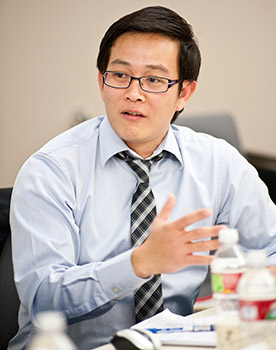
Kosal Path
It’s been three and a half years since Kosal Path’s Institute Fellowship at USC Shoah Foundation. Looking back, he says the fellowship ended up changing his life.
Path is a Cambodian Genocide survivor and scholar with previous positions in the Cambodian Genocide program at Yale University and the Documentation Center of Cambodia from 1995 to 2000. From 2009 to 2011 he was a lecturer in international relations at USC and worked with USC Shoah Foundation Director of Research and Documentation Karen Jungblut to lead undergraduates on research trips to Cambodia on the Problems Without Passports program.
He was named USC Shoah Foundation Institute Fellow in 2012; during his semester in residence he conducted research on the daily life of former Khmer Rouge cadres during the Democratic Kampuchea and the social psychological impact of political indoctrination and thought reform on these cadres. He gave a public talk about his research in September 2012.
Path said the fellowship helped both his scholarly interests and his career path. He recently published an article (see link below) in the Journal of Political Ideologies based on the work he did at USC Shoah Foundation, which allowed him work through his own feelings as a survivor of the Cambodian Genocide on a personal level.
“As a survivor and academic, it is as much a matter of personal exploration of empathy toward former Khmer Rouge cadres through a better understanding of the complexity of their lives as an academic interest in how their children are influenced by their parents’ experiences,” Path said.
The fellowship was also a turning point in his career, Path said. Before the fellowship, he had thought he would return to Cambodia to work as an executive officer of the Sleuk Rith Institute, an academic institute. But the fellowship inspired him to pursue a scholarly career in the United States instead, and he decided to pursue tenure track positions.
In 2013, he was hired as assistant professor in the department of political science at City University of New York’s Brooklyn College. He was awarded a Whiting Fellowship for outstanding teaching in the humanities, which is enabling him this semester to focus on his archival research and writing on the Third Indochina War.
Path also collaborated with colleagues to organize a creative symposium “Reflections in the Aftermath of War and Genocide: Empathy, Co-existence, Imagination, and Resilience” in November 2015, with the support of the Center for the Studies of Genocide and Human Rights at Rutgers University. They hope to hold an enlarged conference on the same subject and publish an edited book.
He was also inspired to direct a study abroad program at Brooklyn College similar to USC’s Problems Without Passports program.
“Looking back, the fellowship at USC Shoah Foundation gave me just the right amount of time to think about my career, and it significantly hardened my determination to become an academic,” Path said.
Path is still just as committed to testimony as a research tool. On his travels and research trips, he continues to hear remarkable stories from survivors of the Cambodia Genocide, like one woman he spoke to recently who shared how small acts of humanity had saved her family during the Khmer Rouge regime.
“For me, testimony allows us to deepen our understanding of the complexity of genocide and offers us an intimate knowledge of individual circumstances, choices and emotions in such a way that documents cannot,” he said. “In the case of the Cambodian genocide, testimony allows me to understand the varied experiences survivors and former KR cadre have.”